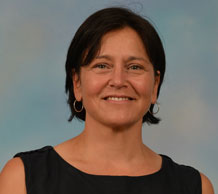Observatory for Political Texts in European Democracies - A European Research Infrastructure
European Commission (Horizon 2020)
Populism's Roots: Economic and Cultural Explanations in Democracies of Europe (PRECEDE)
Volkswagen Stiftung
Media in Context and The 2015 General Election: How Traditional and Social Media Shape Elections
ESRC
Advancing Understanding in News Information, Political Knowledge and Media Systems Research
Economic and Social Research Council (ESRC)
Profile

Professor Susan Banducci
Ph.D. (University of California, Santa Barbara)
Professor and Director of the Exeter Q-Step Centre, Director of Research
3165
01392 723165
Clayden 1.02
My research interests are in the areas of comparative political behaviour, media and political communication. I am PI of TWICEASGOOD - an ERC Advanced Grant (2022-2027, €2.5m) that examines women candidates’ experience of sexism on the campaign trail. The draws on a new module of the European Social Survey Round 11 - Gender in Contemporary Europe.
I am a Fellow of the British Academy (2022) and the Academy of Social Sciences (2020).
My full CV can be found here.
My current projects include:
- Principal Investigator. TWICEASGOOD “Twice as Hard, Half as Good? Women Candidates’ Experience of Sexism on the Campaign Trail.” ERC Adv Grant 2022-2027.
- Exeter Lead , Infra4NextGen. Providing research infrastructure services to support Next Generation EU. Horizon Europe. 2024 – 2028.
- Exeter lead. "OPTED - Observatory for Political Texts in European Democracies - A European Research Infrastructure ". Vienna lead partner – PI Hajo Boomgarden. H2020. 2018-2021.
- Exeter lead. "PRECEDE - Populism’s Roots: Economic and Cultural Explanations in Democracies of Europe". Muenster lead partner. Volkswagen Foundation. 2020-2023.
Research group links
- Centre for Elections, Media & Participation
- Department of Politics
- The University of Exeter Q-Step Centre
Research interests
In general, my research focuses on inequalities in political participation, bringing together individual and institutional explanations for inequalities into multi-level analyses using large-scale cross-national surveys that. These inequalities in political engagement and participation include differences between men and women, minorities and non-minorities as well as how events over the lifecycle can contribute to inequalities. One question that motivates this research, and has significant policy implications, is which electoral rules, political institutions or policies are best at reducing political inequalities. In particular, a number of findings in my research suggest that electoral reforms meant to make participation more meaningful are better at reducing inequalities in diverse societies while reforms aimed at making participation less costly exacerbate these inequalities. Another motivating question is how the news media contribute to or ameliorate inequalities in turnout and political engagement. This latter question has motivated my most recent research.
Research supervision
I supervises students in the area of elections, media and political communication including the uses of social media and new forms of data. Current students are working on elections and representation, gender and online sexism.
Research students
Current Students:
Bella Longdon
Julia van Zijl
Aditi Dutta
Past Students:
Kiran Arabaghatta Basavaraj - UCL
Greg Stride - LGIA
Laszlo Horvath - Birkbeck, University of London
Raluca Popp - University of Kent
Rebecca Tidy - The Impact of Internet Tools upon Volunteer Mobilisation and Party Membership
Siim Trumm, SL at Nottingham, - Roll Call Votes in the European Parliament
Kathrin Thomas, City University London, - Institutions and Policy Responsiveness
Maarja Luhiste, Lecturer at Newcastle - - Gender, Media and Electoral Success
Marc Herzog - Turkey, Muslim Parties and Development (completed 2011)
Sinem Ayangolu - Media Effects in Developing Democracies
Hannah Bunting, Exeter
External impact and engagement
Co-producing knowledge on Political Leadership incubators with support from Policy@Exeter (with PI D. Barrett in Law) for “Campaign Funding for All” project. We produced advice documents on campaign finance and standing as a political candidate with Elect Her. I also serve as a member of the Women Count (Centenary Action Group) Steering Group.
Modules taught
Biography
I have close to 20 years working on international, collaborative projects from the New Zealand Election Study, the European Election Study and 2 early career researcher training networks. My recent research has been supported by the ESRC and I hold and have held funding from the ESRC for three projects. Most recently, I am a co-PI in a project examining the role of the media in the 2015 British Election and I am PI on a European Industrial Doctoral Training partnership funded by the European Commission. For the latter project we have recruited 3 researchers to undertake projects examining the effects of online vote advice tools, the use of voluntary samples for social science analysis and physiological responses to online information.
I was a founding member, 2008, of the Centre for Elections, Media and Parties - CEMaP (now Media, Elections and Participation). In the six years since the founding of the centre, the staff of the centre have earned over £5million in research and consultancy funding that has led to seven funded PhDs students and 5 post-doctoral researchers. I have been principal investigator and a co-investigator on a number of these projects. My overall objective has been to strengthen the capacity for the use of and training in advanced social science methods, strengthen approaches to the comparative study of elections that draw on methodological strengths in the UK such as multi-level modelling, cross-national surveys (e.g. European Social Survey) and media analysis.
